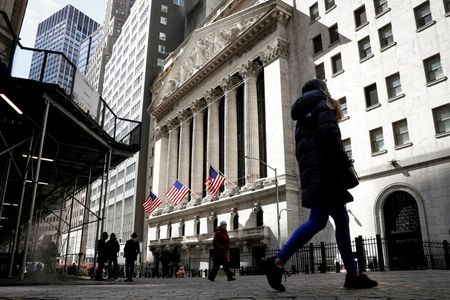By Noel Randewich and Medha Singh
(Reuters) – The S&P 500 ended the week at record high on Friday, lifted by Nike and several banks, while weaker-than-expected inflation data eased worries about a sudden tapering in stimulus by the Federal Reserve.
Nike Inc surged 15.5% to an all-time high after the sneaker maker forecast fiscal full-year sales ahead of Wall Street estimates, helping the Dow lead among the three main indexes.
Bank of America climbed 1.9% and Wells Fargo rallied 2.7% after the Fed announced big banks have cleared stress test and will no longer face pandemic-related restrictions on buying back stock and paying dividends.
The S&P 500 financials index rose 1.3% and was the top performers among 11 sector indexes.
“Today is a bit of profit-taking in tech and a reallocation into the banks after the results of the stress tests,” said Dennis Dick, a proprietary trader at Bright Trading LLC, adding he expects banks to soon announce increased dividends.
A bipartisan Senate deal on infrastructure spending embraced by U.S. President Joe Biden on Thursday continued to lift stocks, with the materials and industrials indexes increasing and helping the S&P 500 outperform the Nasdaq.
“The positive news from the infrastructure package favors the S&P 500 more than then Nasdaq. The Nasdaq does not pour cement into roads and put steel in bridges. That’s the S&P 500,” said Jake Dollarhide, chief executive officer of Longbow Asset Management in Tulsa, Oklahoma.
The latest personal consumption expenditures (PCE) data showed a measure of underlying inflation rose less than expected in May. Core PCE rose 3.4% year-over-year as expected, above the Fed’s 2% flexible target.
Billionaire Richard Branson’s spaceship company Virgin Galactic soared almost 40% and was Wall Street’s second most traded company after receiving approval from the U.S. aviation safety regulator to fly people to space.
With the FTSE Russell reconstituting its indexes following a wild trading year marked by the pandemic and a “meme” stocks, volume on U.S. exchanges surged to 15.1 billion shares, versus the 11.2 billion average over the last 20 trading days.
(Graphic: S&P 500 versus U.S. 10-year Treasury yield, https://fingfx.thomsonreuters.com/gfx/mkt/yzdpxldylpx/spx_yield.PNG)
The Dow Jones Industrial Average rose 0.69% to end at 34,433.84 points, while the S&P 500 gained 0.33% to 4,280.69.
The Nasdaq Composite dropped 0.06%, to 14,360.39.
For the week, the S&P 500 gained 2.7%, the Dow added 3.4% and the Nasdaq gained 2.4%. It was the S&P 500’s strongest week since early February and the Nasdaq’s strongest since April.
FedEx Corp dropped 3.6% after the U.S. delivery firm missed 2022 earnings forecast due to hiring difficulties.
CarMax Inc jumped 6.7% after the used-car retailer topped Wall Street estimates for quarterly revenue, helped by strong demand as more people opted for personal vehicles over public transport due to the COVID-19 pandemic.
Advancing issues outnumbered declining ones on the NYSE by a 1.29-to-1 ratio; on Nasdaq, a 1.22-to-1 ratio favored advancers.
The S&P 500 posted 32 new 52-week highs and no new lows; the Nasdaq Composite recorded 149 new highs and 14 new lows.
(Additional reporting by Devik Jain and Medha Singh in Bengaluru; Editing by Maju Samuel and Aurora Ellis)





